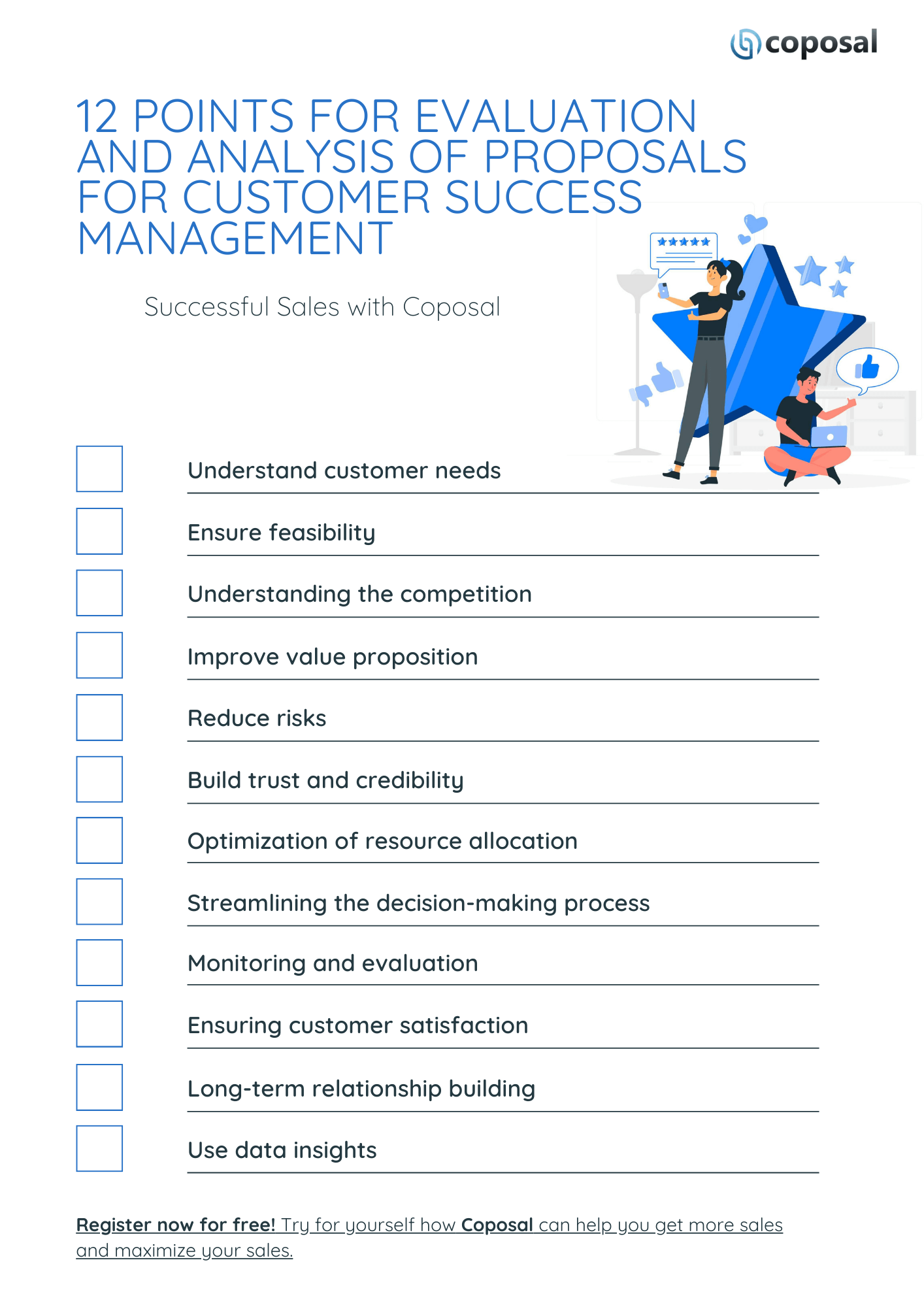 A central point of CSM, Customer Success Management, is the process of evaluating and analyzing proposals. This article discusses the importance of this practice and why it is crucial for ensuring customer satisfaction and long-term success.
A central point of CSM, Customer Success Management, is the process of evaluating and analyzing proposals. This article discusses the importance of this practice and why it is crucial for ensuring customer satisfaction and long-term success.
Table of Contents
- Understanding Customer Needs
- Ensuring Feasibility
- Understanding Competition
- Enhancing Value Proposition
- Mitigating Risks
- Building Trust and Credibility
- Optimizing Resource Allocation
- Streamlining the Decision-Making Process
- Monitoring and Evaluation
- Ensuring Customer Satisfaction
- Building Long-Term Relationships
- Leveraging Data Insights
1 - Understanding Customer Needs
 Customer success management is about understanding and fulfilling the needs of customers.
Customer success management is about understanding and fulfilling the needs of customers.
Proposal evaluation plays a key role in this process as it enables companies to effectively tailor their proposals to meet customer requirements.
By carefully analyzing proposals, companies can ensure that their solutions are aligned with the specific needs and preferences of their customers.
The first step in proposal evaluation is to gain a deep understanding of the customer's needs and pain points.
By identifying the challenges the customer is facing, companies can tailor their proposals to directly address these issues.
This requires active listening and effective communication to uncover the underlying requirements and expectations of the customer.
2 - Ensuring Feasibility
 Once the customer's needs have been identified, it is important to assess the feasibility of implementing the proposed solution.
Once the customer's needs have been identified, it is important to assess the feasibility of implementing the proposed solution.
This involves evaluating the resources, capabilities, and expertise required for the successful execution of the project.
By conducting a thorough feasibility analysis, companies can ensure that their proposals are realistic and achievable within the given constraints.
3 - Understanding Competition
 In addition to understanding customer needs, it is also important to analyze the proposals of competitors in the market.
In addition to understanding customer needs, it is also important to analyze the proposals of competitors in the market.
By examining the proposals of other players, companies can gain valuable insights into market dynamics and identify areas where they can differentiate themselves.
This competitive analysis allows companies to refine their value proposition and position themselves more effectively in the market.
4 - Enhancing Value Proposition
 One of the main goals of proposal evaluation is to enhance the value proposition offered.
One of the main goals of proposal evaluation is to enhance the value proposition offered.
By highlighting their unique selling points and differentiators, companies can differentiate themselves from the competition and demonstrate why their solution is the best choice for the customer.
This involves showcasing the benefits of choosing their proposal over alternatives in the market.
5 - Mitigating Risks
An effective proposal evaluation also includes the identification and mitigation of potential risks associated with the proposed solution.
By conducting a risk assessment, companies can anticipate potential obstacles and develop strategies to proactively address them.
This approach to risk mitigation builds trust with the customer and demonstrates the company's commitment to delivering results.
6 - Building Trust and Credibility
 Proposal evaluation is not just about presenting a compelling proposal; it is also about building trust and credibility with the customer.
Proposal evaluation is not just about presenting a compelling proposal; it is also about building trust and credibility with the customer.
By conducting thorough analyses and providing transparent information, companies can establish themselves as reliable partners who care about the success of their customers.
This trust-building process lays the foundation for long-term relationships and repeat business.
7 - Optimizing Resource Allocation
Another benefit of proposal evaluation is optimizing resource allocation to maximize return on investment (ROI).
By carefully evaluating the resources required for each project, companies can use their resources more effectively and efficiently.
This ensures that resources are allocated where they can have the greatest impact and deliver the best results for the customer.
8 - Streamlining the Decision-Making Process
 Proposal evaluation also plays a crucial role in optimizing the decision-making process for customers.
Proposal evaluation also plays a crucial role in optimizing the decision-making process for customers.
By presenting clear, well-structured proposals, companies can provide the information and insights that customers need to make informed decisions quickly and confidently.
This enables a smoother sales cycle and reduces the time and effort required to close deals.
9 - Monitoring and Evaluation
Once a proposal has been accepted, the work is not done.
Effective proposal evaluation also involves ongoing monitoring and evaluation of project performance.
By tracking key metrics and gathering feedback from customers, companies can identify areas for improvement and make iterative adjustments to future proposals.
This continuous improvement process ensures that the company can respond to changing customer needs and market dynamics.
10 - Ensuring Customer Satisfaction
Ultimately, the goal of proposal evaluation is to ensure customer satisfaction and success.
By delivering on their promises and exceeding customer expectations, companies can build strong and lasting relationships with their customers.
This requires a commitment to quality, responsiveness, and continuous improvement to ensure that customers are satisfied with the results.
11 - Building Long-Term Relationships
 Effective proposal evaluation is about more than just winning a single contract.
Effective proposal evaluation is about more than just winning a single contract.
It is about building long-term relationships with customers.
By continuously providing value and exceeding expectations, companies can foster loyalty and engagement with their customer base.
This continuous relationship building is essential for sustainable growth and profitability.
12 - Leveraging Data Insights
Proposals serve as repositories for valuable data and provide insights into market trends, competitive strategies, and customer preferences.
By leveraging these insights through thorough analysis, companies can make informed decisions and drive continuous improvements and innovations.
Summary
In summary, evaluating and analyzing proposals is a crucial aspect of customer success management.
By understanding customer needs, analyzing proposals from competitors, enhancing the value proposition, mitigating risks, and building trust and credibility, companies can drive customer success and achieve sustainable growth.
Through a strategic approach to proposal evaluation, companies can position themselves as trusted partners committed to delivering results for their customers.
 Reading Tip: If our article has been helpful and you want to learn more about proposal management and customer success management, continue reading here: "Future Trends in Online Proposal Management"
Reading Tip: If our article has been helpful and you want to learn more about proposal management and customer success management, continue reading here: "Future Trends in Online Proposal Management"
Frequently Asked Questions about Proposals and Customer Success Management
Why is proposal evaluation important for customer success management?
Proposal evaluation ensures that companies understand and effectively meet customer needs, leading to greater satisfaction and success.
How does proposal evaluation help build trust with customers?
By conducting thorough analyses and providing transparent information, companies can establish themselves as reliable partners who care about the success of their customers.
What common pitfalls should be avoided in proposal evaluation?
Common pitfalls include lack of understanding of customer needs, neglecting competitive analysis, and insufficient risk mitigation for the proposed solution.
What are the main benefits of proposal evaluation?
Proposal evaluation offers numerous benefits, including gaining insights into customer needs, improving solution effectiveness, and fostering long-term relationships.
How does proposal analysis contribute to customer satisfaction?
Proposal analysis allows companies to align solutions with customer goals and ensure satisfaction by considering specific needs and preferences.
Is proposal evaluation a one-time process?
No, proposal evaluation should be an ongoing process that enables companies to effectively adapt to changing customer needs and market dynamics.
What role do data play in proposal evaluation?
Data serve as a crucial resource for proposal evaluation, providing insights into market trends, competitive strategies, and customer preferences.
How does proposal evaluation optimize decision-making?
By synthesizing insights from proposal analysis, companies can expedite decision-making processes, increasing agility and responsiveness.
Why is continuous improvement essential in proposal evaluation?
Continuous improvement ensures that solutions remain relevant and effective, addressing changing customer needs and market trends to drive innovation and competitiveness.